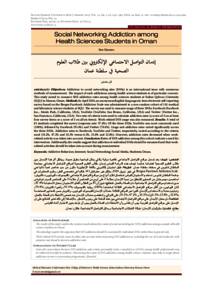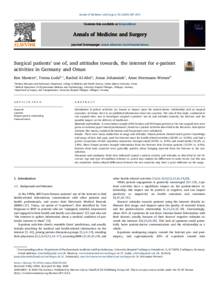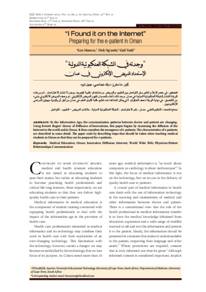وثيقة
Social networking addiction among health sciences students in Oman.
المعرف
DOI: 10.18295/squmj.2015.15.03.009.
عناوين أخرى
إدمان التواصل الاجتماعي الإلكتروني بين طلاب العلوم الصحية في سلطنة عمان
الناشر
College of Medicine, Sultan Qaboos University.
ميلادي
2015-08
اللغة
الأنجليزية
الملخص الإنجليزي
Objectives: Addiction to social networking sites (SNSs) is an international issue with numerous methods of measurement. The impact of such addictions among health science students is of particular concern. This study aimed to measure SNS addiction rates among health sciences students at Sultan Qaboos University (SQU) in Muscat, Oman. Methods: In April 2014, an anonymous English-language six-item electronic self-reporting survey based on the Bergen Facebook Addiction Scale was administered to a non-random cohort of 141 medical and laboratory science students at SQU. The survey was used to measure usage of three SNSs: Facebook (Facebook Inc., Menlo Park, California, USA), YouTube (YouTube, San Bruno, California, USA) and Twitter (Twitter Inc., San Francisco, California, USA). Two sets of criteria were used to calculate addiction rates (a score of 3 on at least four survey items or a score of 3 on all six items). Work-related SNS usage was also measured. Results: A total of 81 students completed the survey (response rate: 57.4%). Of the three SNSs, YouTube was most commonly used (100%), followed by Facebook (91.4%) and Twitter (70.4%). Usage and addiction rates varied significantly across the three SNSs. Addiction rates to Facebook, YouTube and Twitter, respectively, varied according to the criteria used (14.2%, 47.2% and 33.3% versus 6.3%, 13.8% and 12.8%). However, addiction rates decreased when workrelated activity was taken into account. Conclusion: Rates of SNS addiction among this cohort indicate a need for intervention. Additionally, the results suggest that addiction to individual SNSs should be measured and that workrelated activities should be taken into account during measurement.
المجموعة
URL المصدر
zcustom_txt_2
Masters, Ken (2015). Social Networking Addiction among Health Sciences Students in Oman. Sultan Qaboos University Medical Journal, 15 (3), 357–263.
الملخص العربي
الهدف: يعد إدمان مواقع التواصل الإجتماعي ظاهرة دولية والتي يمكن قياسها بطرق عديدة. ويشكل أثر هذا الإدمان بين طلاب العلوم الصحية اهتماما خاصا. تهدف هذه الدراسة لقياس إدمان طلاب العلوم الصحية لمواقع التواثل الاجتماعي بجامعة السلطان قابوس في مسقط، سلطنة عمان. الطريقة: طبق استبيان إلكتروني باللغة الإنجليزية مكون من ست عناصر تعبأ ذاتيا هي Bergen Facebook Addiction scale في شهر إبريل 2014، بشكل غير عشوائي 141 طالبا في تخصصي الطب وعلوم المختبرات في جامعة السلطان قابوس. استخدم الاستبيان لقياس استعمال ثلاث أنواع من مواقع التواصل الاجتماعي (الفيسبوك)، (اليوتيوب)، (التويتر). استخدمت مجموعتان من المعاييلا للتحقق من نسبة الإدمان (علامة 3 على أربع من العناصر أو علامة 3 على العناصر الست). تم قياس مدى استخدام مواقع التواصل الاجتماعية ذات الصلة بالعمل. النتائج: تبين أن 81 من الطلاب أكملوا الاستبيان (معدل الاستجابة 57.4%). كان اليوتيوب من أكثر مواقع التواصل الاجتماعي الثلاثة استخداما (100%) ويليه (الفيسبوك) (91.4%) وأخيرا (التويتر) (70.4%). وتباينت معدلات الاستخدام والإدمان كثيرا عبر المواقع الثلاثة. معدلات الإدمان للفيسبوك ، اليوتيوب، والتويتر حسب المعايير المستخدمة 12.8% و 13.8%، 6.3%، إزاء 3.33% و 47.2%، 14.2%) على التوالي. وانخفضت معدلات الإدمان عند فحص الأنشطة ذات الصلة بالعمل. الخلاصة: دل معدل الإدمان على مواقع التواصل الإجتماعي بين هذه الدفعة على وجوب التدخل. بالإضافة إلى ذلك تشير النتائج على أن الإدمان على مواقع التواصل الفردية يجب أن تقاس وأن الأنشطة ذات الصلة بالعمل يجب أن تؤخذ بعين الاعتبار أثناء القياس.
قالب العنصر
مقالات الدوريات



